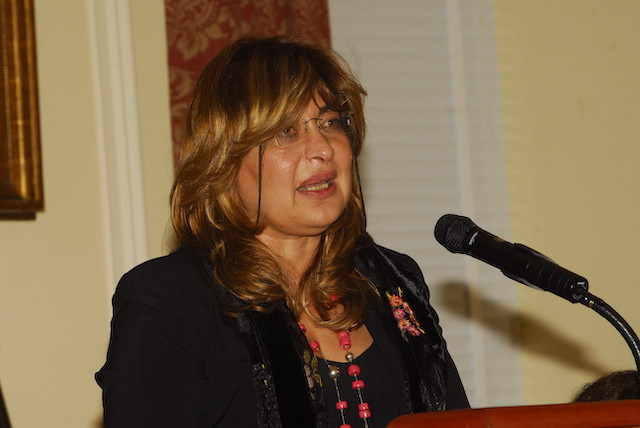Through articles by and interviews with feminists who are experts in their respective fields, 5Harfliler’s “Istanbul Convention Brief” investigates the significance of the Istanbul Convention in the fight against gender-based violence, and what it would mean for women if Turkey were to withdraw. Tuğçe Yılmaz is the editor-in-chief of the series.
In summer 2020, in the midst of the Corona pandemic, it is very striking that a possible withdrawal of Turkey from the Istanbul Convention, the Council of Europe Convention on preventing and combating violence against women and domestic violence, became the subject of a hot national debate.[1]
The convention was named “Istanbul” because it was opened to signatures in the 121st meeting of the Committee of Ministers of the Council of Europe held in May 2011, in Istanbul during Turkey’s six-month Chairmanship.
It was not an easy feat for Turkey to coin the convention’s name, which was made possible through extensive efforts of the Justice and Development Party (AKP) in government and its Ministry of Foreign Affairs at the time. As is often the case with international conventions, states compete with each other to have conventions named after a city within their territory to gain international leverage and soft power. Turkey worked tremendously hard to reach an agreement with member-states on the convention to open it for signatures in Istanbul in May 2011 and it became the first country to sign it.
They also enlisted the support of Professor Feride Acar, a member of the independent task force established by the Council of Europe in 2006, which facilitated the convention. Prof. Acar, a former Chairperson and member of the UN Committee on the Elimination of Discrimination Against Women (CEDAW) was invited to the task force as an independent expert from Turkey by the council. In 2008, the Task Force recommended the adoption of a comprehensive, legally-binding, human rights instrument to prevent and combat all forms of violence against women. Between 2009 and 2011, Prof. Acar was officially appointed as a negotiator on behalf of the Turkish state for the finalization and adoption of the convention. Upon the request of the Turkish state, she played a key role in the process that led to the adoption of the convention at the meeting of the Council of Europe in Istanbul in May 2011.
The efforts of the AKP government delineated above were completely in line with AKP’s politics and policies of the time and its aim to present a good image to the international community. The convention served the AKP government to showcase its compliance with the norms of the European Union, the Council of Europe and the international norms on gender equality. As a result, the Justice and Development Party would gain considerable international leverage and soft power as mentioned before.
In the eyes of the international community, it would also function as a steadfast commitment to eradicating violence against women, especially after the Opuz decision of the European Court of Human Rights (ECHR) of June 9, 2009. Mrs. Opuz and her mother had experienced intense violence from her husband for many years. After her mother was murdered by her husband, she brought her case to the ECHR against the Turkish government for failing to protect her and her mother from the prolonged attacks of the perpetrator.
Ruling for the plaintiff, the Court found that the Turkish government violated three articles of the European Convention on Human Rights: Article 2, the right to life; Article 3, the prohibition of torture and inhuman treatment; and Article 14, the prohibition of discrimination.
The Opuz decision was a landmark decision of the ECHR, holding governments accountable “for failing to take adequate steps to protect victims of repeated domestic violence, even absent any active malfeasance on the state’s part.” More significantly, the Opuz case was the first time the Court had identified a state’s failure to address domestic violence as a form of gender-based discrimination. That is, it was not the law (Family Protection Act, Law no. 4320) that was the problem, but the general and widespread discriminatory attitude of the authorities that needed to be remedied.
“The decision recognizes that domestic violence against women is a systemic problem reflecting a fundamental imbalance of power. Although individual acts of violence within the private sphere can be attributed to specific persons, violence against women is generally perpetuated through male domination of judicial and law enforcement institutions. The Court’s judgment places a strong burden on states to protect women from domestic violence.”[2]
After the ECHR decision, the AKP government showed conflicting sentiments about it. Some perceived the decision as a motivational factor to take stronger measures against gender-based violence. Others, such as Selma Aliye Kavaf, the State Minister for Family and Social Policy[3] and Güldal Akşit, the head of AKP’s Women Branch at the time opposed the decision, claiming that the case was an isolated event and the legal instruments to protect women from violence in Turkey were sufficient. They stated that they planned to appeal the decision.
Even then, gender equality or even violence against women were issues of conflict within the AKP and the government. However, the opposers lost at the time. The decision became a strong incentive for Turkey to spend tremendous efforts towards the Istanbul Convention. As a result, Turkey became the first country to sign and ratify it.
Fatma Sahin replaced Kavaf as Minister of Family and Social Policy in 2011. She worked very hard together with autonomous women’s organizations to improve law no. 4320 on protection of women from violence. She said that they were under immense pressure to realize protection of women from violence and to eradicate femicides. Law no: 6284 to Protect Family and Prevent Violence against Women was accepted by the Parliament on March 8, 2012.
For years, the AKP was proud of these developments and portrayed them as commendable achievements until recently. Even in 2019, First Lady Emine Erdogan applauded the protection orders of Law no. 6284 in her speech on November 25, the International Day for the Elimination of Violence against Women. She also stated that violence has become more visible and expressed her concerns regarding the continuing prevalence of violence against women in Turkey.
So, we are left with very critical questions: How can we interpret this drastic change in attitude? How did the opposers of gender equality and international norms within AKP get the upper hand within a few years? As the Turkish public is increasingly and loudly demanding the prevention of violence against women, how can we account for the recent explicit opposition to the Istanbul Convention by top AKP officials?
Despite the current decision made and action taken by Turkey, I’m afraid, the questions will remain to haunt us. The Istanbul Convention has become a very critical lens not only to see the record of gender equality in Turkey but also to predict AKP’s and Turkey’s future.
[1] For a short survey of previous debates and changes to the penal code instigated by the women’s movement please see: http://kadinininsanhaklari.org/wp-content/uploads/2018/06/IDS-TCK-Pinar-makale.pdf
[2] Tareq Abdel-Monem, “Opuz v. Turkey: Europe ‘s Landmark Judgment on Violence against Women” Human Rights Brief, 2009 Vol 17 Issue 1.
[3] “Prime Minister Recep Tayyip Erdoğan announced that the “Ministry for Women and Family” will be replaced by a “Ministry of Family and Social Policies,” ending a much-needed explicit focus on women’s rights… Erdoğan made the change on June 8, 2011, four days before the June 12 general election, as part of a revised structure for the Council of Ministers. This is much more than just a name change and signals a reduced emphasis on women’s rights, and efforts to promote the rights to non-discrimination and freedom from violence will suffer.” https://www.hrw.org/news/2011/06/09/turkey-backward-step-womens-rights




